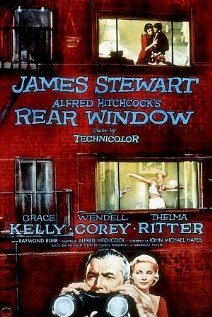Few films have ever created an atmosphere as suspenseful as Alfred Hitchcock’s 1954 masterpiece Rear Window. Despite being set entirely within a single apartment, the picture never feels claustrophobic. In fact, as Hitchcock explores the nature of voyeurism from the comfort of our protagonist’s New York City apartment, the film somehow manages to feel worldly.
Our hero is L.B. Jeffries (James “Jimmy” Stewart), a dedicated photographer who got a little too close to the action on his last assignment and broke his leg, confining him to wheelchair. With limited mobility, Jeffries is forced to stay in his cramped apartment and has plenty of free time between visits from his masseuse (Thelma Ritter) and a Goddess of a girlfriend, Lisa Fremont (Grace Kelly).
To pass the time, Jefferies begins watching his neighbours using a telephoto lens and a pair of binoculars. Late one night, Jefferies observes a couple in the opposing apartment, the Thorwalds, engage in a heated argument. The next morning, Jeffries’ curiosity turns into concern when Mrs. Thorwald is missing and never seen again.
The film quickly boils down to Jeffries believing Mr. Thorwald (played by Raymond Burr) murdered his wife. Of course, no one except for Lisa believes, or even considers, his story. Compelled to act upon their suspicions, the two start sleuthing together, examining Thorwald’s every move. The result is an enigmatic and engaging thriller underpinned by Hitchcock’s fascination with the ethics of voyeurism, a subject raised by Jeffries himself when he rhetorically ponders whether “it is ethical to watch a man with binoculars and long-focus lens?”
But while Rear Window can be considered a shrewd cinematic study of humanity’s inherent curiosity, that doesn’t make it a confounding film. It’s not, say, as dark and deceptively surreal as Vertigo; a psychodrama that begs to question the humanity of the filmmaker behind the camera. But nor does it need to be. What makes this film worthy of being lauded as a classic is, in part, due to its accessibility. Sure, some may find it difficult to get invested in the first 30-minutes of the picture, which is deliberately paced and rather bleak. But for those wise enough to let the unforced and nuanced story tell itself, you will be rewarded with one of the most captivating thrillers ever committed to film.
Often proclaimed as a product of its time, Rear Window holds up, like all genuine masterpieces, in any era. Essential as it is spellbinding, Hitchcock’s film is a provocative yet immensely entertaining film that deals with the ethical consequences of an increasingly voyeuristic society. Once you watch Rear Window, you’ll never forget it.
–
Sam Fragoso is a web-based film journalist who writes at dukeandthemovies.com.

![Rear Window [1954] (Review)](/wp-content/uploads/rear-window-original1-e1309957183694-700x344.jpg)



![Lolita [1962] (Review) Lolita [1962] (Review)](/wp-content/uploads/lolita-011-e1310700314319-150x150.jpg)










